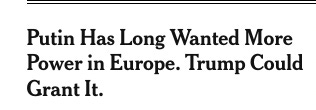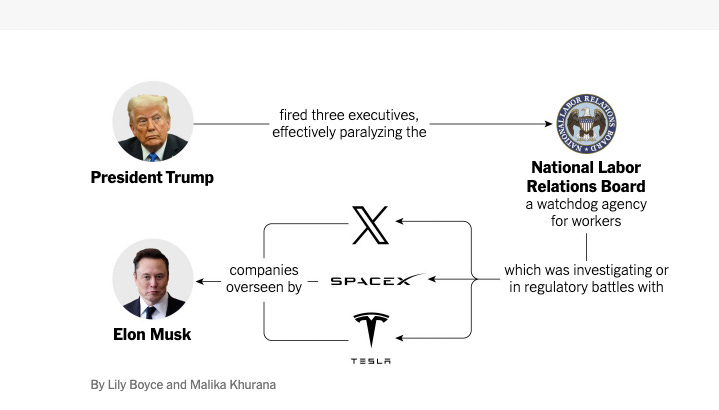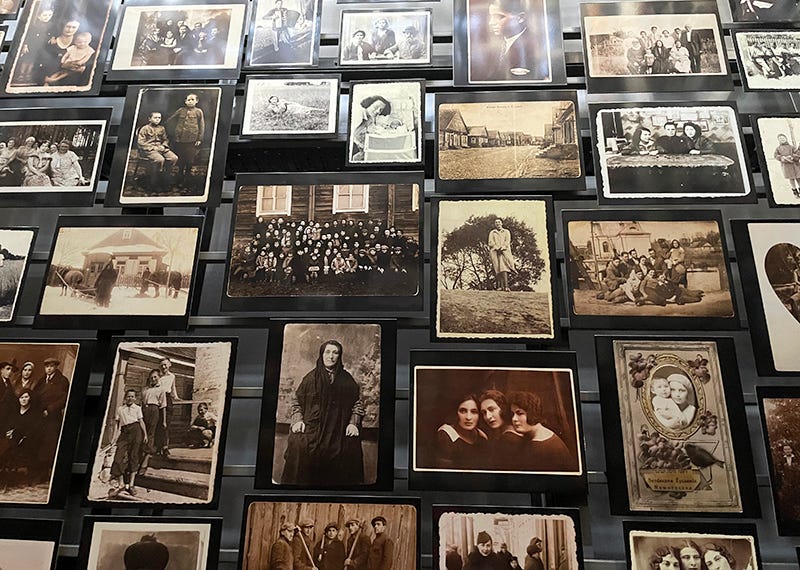From Here to Resilience
With help from a collection of screenshots and the writers I always turn to in times of crisis.
My memory isn’t great. It’s not a new thing, don’t worry. It’s been this way for years. I often wonder if I really did damage some part of my brain while I was drinking. (Though I don’t think so – I had my liver and everything else checked when I got sober and I appeared to be intact.) At other times I think I’m simply not good at retaining information, or that this is yet another sign of (undiagnosed) attention deficit disorder. I read so much and yet I can’t articulate back to you exactly what I’ve just read.
Maybe I’m just reading too much too fast. But when faced with a baffling situation (i.e., our country right now), my knee-jerk reaction is to read whatever I can to better understand the circumstances, the history, the nuances.
I bring this up only to (partly) explain an odd habit: I am a chronic screenshotter. And right now, I am screenshotting (command-shift-4 on the Mac) a lot. Every headline that blows me away, quotes from experts, statistics and graphs, whole paragraphs from opinion pieces. They are like puzzle pieces for me. When I go back and reread them, I can put them together and visualize the big picture much better. I keep them all in a folder on my desktop; I even recently made a quick attempt to turn some of them into a collage but realized that was a huge undertaking.
There’s another reason I collect these screenshots: I want a record. Some part of me is afraid that history is going to get rewritten (wouldn’t be the first time), and this whole era is going to get white-washed (literally). I’m afraid that writers and statisticians and experts are going to have their voices and their tools taken away (already happening), and that truth will be manipulated and ultimately buried.
I’m afraid that even right now, the voices of experts – on economics, on science, on international relations, on law, on health – are not being disseminated to enough people. I find myself having imaginary conversations with people, trying to articulate what I’ve read (shuffling my file of screenshots in my head), to offer proof that things are not right.
Yes, I admit, these imaginary conversations are a sign that my anger is still not completely under control. But I am working on it.
I started screenshotting during the pandemic. I was so blown away by what the news was reporting that it almost didn’t seem real. I had to make a record of it so that I could understand it. (Oddly, right now feels a bit like the early days of the pandemic, doesn’t it? Like we’re waiting for the other shoe to drop. Though it feels like the entire shoe department of Nordstrom’s just collapsed into the basement.)
Last year when my husband and I went to the United States Holocaust Memorial Museum in Washington, D.C., I was particularly affected by an exhibit – a wall two stories high – of striking black and white portraits of the people of a particular Polish town (Szczuczyn, Poland). In the museum, you are introduced to these people by walking across a bridge near the wall on the second floor. You learn that a professional photographer, Zalman Kaplan, took the photos of everyday family life of the town’s Jewish inhabitants in the years before the war. You learn the town was then occupied by the Germans.
But only when you continue down to the first floor, and cross back through the room at the lower level, do you learn that every one of these beautiful people, including the photographer, was either shot and killed or sent to the camps. We just happen to have this poignant record of their happy lives before the war, thanks to the photographer’s grandson, who spent years collecting the photos. I took pictures of those pictures, because I wanted to remember those people.
My screen shots are my records, my way to remember, to study and to learn.
I don’t want to turn away from reality or history. I don’t want to be one of those people who, in the future, professes that he or she had no idea what was going on.
Not that it isn’t easier to tune out the noise. And this isn’t just any old noise. This is torture-level noise. A cacophony of horrifics, designed to break us. (Yes, horrific is an adjective, but I’ve decided it should be a noun, too.)
Right now, I feel bifurcated. Like there are two Susies: One who is longing to hibernate, tune out the noise, do the next right thing, keep calm and carry on.
The other is a raging lunatic.
Well, not really. But I have had every possible emotion in reaction to the multiple ways in which things are currently going wrong in our country – starting with the world’s richest man (men) dicking around with the lives and livelihoods of millions of under-privileged people (nearly everyone compared to these guys) who are at the mercy of his/their lust for power. Honestly, if it weren’t so pathetic it would be a farce. But funny it is not.
One of the emotions I’ve had is sheer and utter disgust. Just yesterday, the vice president of the United States insulted European leaders – our longtime allies – and threw his support (just before an election) – to an alt-right political party in Germany (that Musk already supports), known for its anti-Semitic and anti-immigrant views as well as its trivialization of the Holocaust.
Along with the disgust, I’ve felt dismay and disappointment.
Today The Washington Post reported the discovery of internal documents that clearly detail the mission of DOGE, which apparently (surprise, surprise) was, from the start, not created to improve government efficiency, but to kill all diversity, equity and inclusion programs across government agencies.
The documents detail a three-stage assault, already under way (obviously) that will eventually result in mass firings. So, one of our administration’s top priorities is not to make government more efficient; it is to destroy equal rights. Which is code for making life less bearable for anyone who is not a straight white male (with means).
If it weren’t already clear – as Trump has rolled out his initiatives in lockstep with the Project 2025 playbook – it is now clear as daylight that the goal of all this chaos and consolidation and erasure of equality is to empower White Christian Nationalism1 as Trump himself said, while campaigning, that he would do when he got in office. It is also becoming more and more clear that Musk has aligned himself with this group simply as a means to concentrate his own power.
Today Trump posted on his social media accounts a quote attributed to Napoleon:
He who saves his Country does not violate any Law.
In Trump, Christian Nationalists have found the perfect tool to achieve their goals, whether he knows it or not. They must be filled with glee. He gets the power he craves, they get to advance their agenda. Or maybe Musk trumps them both.
So yes, I’d have to add fear to my list of emotions.
But traveling through these emotions – and vacillating from one extreme (hide!) to another (speak out!) – is actually getting me somewhere, I think. I’m slowly learning how to flex without breaking, how to bounce back to the center quickly. I’m beginning to feel a spark of strength in my core.
I think I am developing some resilience.
Resilience is a word that is suddenly on repeat in our collective vocabulary. I’m hearing it a lot these days from people I admire – writers, artists, ministers, teachers, and activists.
Resilience is the ability to recover from or adjust easily to misfortune or change. It doesn’t mean you have to accept the misfortune. It means you have to stretch yourself to deal with it.
Becoming resilient begins with taking care of yourself – managing stress, being realistic about goals, nurturing self-confidence. Next, it requires changing the narrative. You don’t have to engage in toxic positivity. But neither do you (we, I) have to emote gloom and doom all the time. (After all, the results of the initiatives happening right now are not a foregone conclusion. We still have a voice – and the law. For now.)
But you must try to be optimistic, to exercise a little faith – mostly for your own sake, to make room for resilience to grow. You have to recognize that resentment and anger are self-defeating (hello, Susie!); that compassion and gratitude aren’t for your enemies – they’re for you. You don’t have to carry someone else’s bad energy.
I know, easier said than done. It finally occurred to me (duh), as I packed my bags for another trip to Delaware and noticed a stack of Anne Lamott books on my bureau, that I had help waiting for me right on my bookshelves. Why not go back to the writers who I’ve always turned to in a time of crisis? As a result, I filled up a whole canvas bag with slim volumes from Lamott, Pema Chodron, Wendell Berry, Mary Oliver, Cheryl Strayed, E.B. White and John O’Donohue. I’m thinking I’ll take a half hour every morning to read from one of them.
I think building resilience takes time, and while it seems like we don’t have time, we need to take it. We need to be in this for the long haul.
A red-tailed hawk came to visit the other day. He stayed so long on the branch outside my bedroom window, staring at me much of the time, that I began to wonder what he was trying to tell me. At last, I realized he was telling me to look up, look all around, to see the big picture. And to be vigilant. 💚
—

















Stunning. Breathtaking. Terrifying. Absolutely disgusting. Unsurprising. And every reason to never give in. Never.
Oh Susie, thank you for this excellent look at what's going on in our country (and beyond) just now. It's hard to not be consumed by anger and fear, but you make so many good points about developing resilience. -- from your equally bifurcated friend, Lorene